More than 80 UK projects receive nearly £1.2 million in first Immersive Arts funding round

Almost £1.2 million has been allocated to 83 artist-led projects across the UK, including several in the Bristol and South West region, in the first round of Immersive Arts funding - a scheme supporting artists of all backgrounds and experience to work with immersive technologies.
With three distinct grant amounts available - £5,000, £20,000 and £50,000 – the funding supports artists at different stages of their creative development: to explore, experiment or expand how they make work that uses technology to actively engage an audience.
Immersive Arts received 2517 applications from across England, Wales, Scotland and Northern Ireland – a much higher than expected volume, revealing a high level of interest and demand for opportunities from artists seeking to make and share extraordinary immersive work.
In this, the first round of Immersive Arts funding, £1,180,000 has been awarded as follows:
- 50x £5,000 - Explore grants
- 24x £20,000 - Experiment grants
- 9x £50,000 - Expand grants
The 83 successful projects will be exploring many different art forms, including dance, theatre, visual arts, music, games, animation, film, sculpture and live art. They will work with a broad range of technologies including virtual, augmented and mixed reality, spatial audio, interactive projections, machine vision, responsive environments, artificial intelligence, haptics and connected textiles.
Principal Investigator and Director of Immersive Arts, Verity McIntosh, Associate Professor of Virtual and Extended Realities at UWE Bristol, said:
“We are delighted that people have trusted us with their brave and brilliant ideas and are very excited to now see so many of these ideas being taken forward. These artists are exploring immersive technologies in a myriad of exciting and distinctive ways, developing a community of practice, and practice-led research that we hope will last for many years to come.”
Commenting on behalf of the programme funders, the UKRI Arts and Humanities Research Council (AHRC), Arts Council England (ACE), the Arts Council of Wales (ACW), Creative Scotland and the Arts Council of Northern Ireland (ACNI), AHRC executive chair Christopher Smith said:
“Immersive technologies offer the UK’s artists and creatives new and exciting ways to produce work that engages the public and promotes growth in our creative industries. This programme is designed to give them access to these cutting edge creative technologies to see how they can be used, and it is clear from the number of applications that it is an opportunity they are eager to take. We cannot wait to see what further innovations they can unlock and which new creative frontiers they can explore.”
A full list of first-round Immersive Arts funded projects is available on the Immersive Arts website. Funded projects include:
Bristol, England: The Whale by Sharon Clark (Raucous) and Jack Hardiker-Bresson (Office of Everyone) – awarded an Expand grant.
The Whale is an immersive reimagining of Herman Melville’s Moby Dick, designed for live audiences and co-created by Jack Hardiker-Bresson (Office of Everyone) and Sharon Clark (Raucous). This innovative project cultivates dynamic relationships between 180° digital projected content and physical environments, drawing on the ecological themes at the heart of the original narrative. The work introduces a pioneering form of spatial creative captioning, offering new ways for deaf and hearing-impaired audiences to engage with immersive narratives that are not tethered to a stage or an interpreter. The captioning is dynamic, responding to and emanating from the performer or world. Performances are inherently relaxed, with audiences encouraged to move around the environment and performers. With a blend of expansive 180° projection, dynamic physical environments, spatial sound, and live actors, it creates a collective experience that could be seen as a more communal form of virtual reality.
Cardiff, Wales: We Live In An Old Chaos of the Sun by Jack Philp - awarded an Expand grant.
‘We Live In An Old Chaos of the Sun’ is a new contemporary dance work bringing together worlds of choreography with immersive, realtime digital technology. It’s a moment to ponder our relationship with what’s to come. Pioneering and avant-garde, the project brings together a diverse array of talents at the forefront of their respective fields, uniting award-winning and critically acclaimed creatives with long-standing connections to communities, audiences, and venues throughout the UK. The work invites you into a world where technology is something to embrace; it’s playful, collaborative, and ultimately it’s human. As we step toward the future, this work is powered by the belief that we have a lot to look forward to.
Downpatrick, Northern Ireland: The Baby Factory is Closed by Deepa Mann-Kler (CEO Neon) - awarded an Expand grant.
‘The Baby Factory is Closed’ is a hybrid documentary multiplayer immersive experience redefining how the menopause is understood and discussed, transforming it from a stigmatised topic into an empowering narrative with shared knowledge through innovative storytelling and multi-sensory technology. It gives audiences an embodied understanding of the physical and emotional realities of menopause, breaking down barriers to empathy and awareness.
Dumfries, Scotland: The Phanto Spectra by Martin Joseph O’Neill (Artistic Director The Stove Network) - awarded an Experiment grant.
Phanto Spectra will be an immersive, site-specific audio-visual performance that transforms Dumfries' riverbanks into a living, sensory exploration of its hidden histories. Drawing inspiration from Scotland's Travelling Showpeople—guardians of travelling fairs and masters of illusion since the 1200s—the project will celebrate their spirit through sound, light, and storytelling. Audiences will ‘tune in’ to spectral voices and forgotten tales, while dynamic lighting will breathe new life into the landscape, echoing the vibrant displays of the Showpeople's past. Blending innovative technologies with community narratives and historical research, this experimental project will craft haunting soundscapes using binaural recordings, while theatrical lighting and digital projections will create illuminated portals of memory.
Opening up the immersive sector
The Immersive Arts programme aims to create an inclusive and accessible environment for creative people to engage with immersive technologies. This includes artists who have never had the opportunity to work in this way before, and those who have been marginalised within the sector. There is clear evidence that people in the UK are unjustly disadvantaged on the basis of gender, ethnicity and disability (among other factors). These inequities are well documented in the arts and can be more pronounced where technology is involved. The Immersive Arts team is working to counter these inequities and are extremely encouraged to have received applications from artists with a rich diversity of lived experiences, from across the UK.
Of those receiving funding in this round, almost a quarter identify as from the Global Majority, nearly two-thirds identify as women, genderqueer, non-binary or another minoritised gender, and over half are disabled, D/deaf, neurodivergent, or have a long-term physical or mental health condition or chronic illness.
Jo Verrent, Director of Unlimited - an arts commissioning body that supports, funds and promotes new work by disabled artists, and member of the Immersive Arts consortium - said:
“We set ourselves the target of awarding at least 23% of funding to disabled artists - reflecting the number of disabled people in the population. This has led to remarkable results: over 40% of the applications came from disabled artists and more than 50% are receiving awards. This isn't just a statistic, it's clear evidence that disabled artists are not only eager to work in this field but are producing outstanding, innovative work. They just need barriers removed so they can do so on an equitable basis. I’m beyond excited to see the results.”
Immersive Arts is hosting its first annual event The Big Thing on 9 - 11 June 2025 in Bradford, the UK City of Culture. The Big Thing brings together artists, creatives, researchers and technologists from across the UK and beyond who want to shape the future of immersive art. For more information about The Big Thing and further funding opportunities, visit immersivearts.uk
Funding for Immersive Arts is provided through a collaboration between the UKRI Arts and Humanities Research Council (AHRC), Arts Council England (ACE), the Arts Council of Wales (ACW), Creative Scotland and the Arts Council of Northern Ireland (ACNI). Funding from Creative Scotland, ACW and ACNI is provided by The National Lottery.
Related news

12 December 2025
Arnolfini appoints Professor Paul Gough as new Chair of Trustees
Arnolfini, partner organisation of UWE Bristol, has appointed Professor Paul Gough as its new Chair of Trustees.

13 November 2025
Bristol’s screen industry experiences “boom-and-bust cycle” after post-pandemic recovery, new research from UWE Bristol finds
New research from UWE Bristol provides detailed insight into Bristol's screen sector.
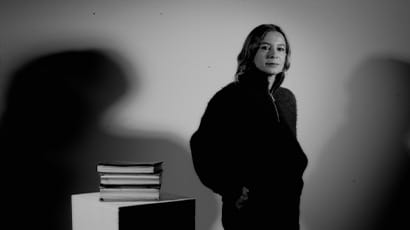
30 October 2025
Lecturer shortlisted for prestigious European photography award
Dr Amak Mahmoodian, senior lecturer in photography at UWE Bristol, has been shortlisted for the Deutsche Börse Photography Foundation Prize 2026.
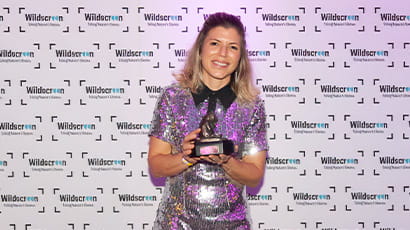
27 October 2025
Graduate wins second industry award for breakthrough film
Tatiana McCabe has won a Wildscreen Panda Award for her documentary which follows a local hero protecting coastal wildlife in Uruguay.
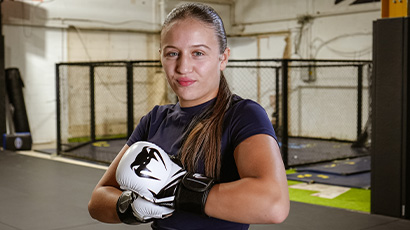
02 October 2025
Documentary by UWE Bristol graduate airs on national television
Hannah Tyson, a UWE Bristol MA Filmmaking graduate, is celebrating the broadcast of her documentary ‘Jazzy’s MMA Dream’, which has aired on CBBC.
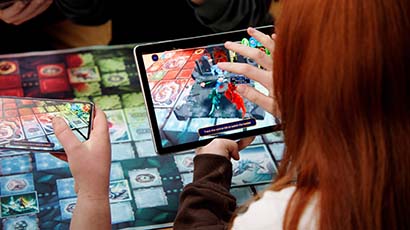
11 September 2025
New study to investigate augmented reality as an intervention for emotionally based school avoidance
A UWE Bristol researcher will support a new study exploring whether an augmented reality board game can help young people with emotionally based school avoidance (EBSA).
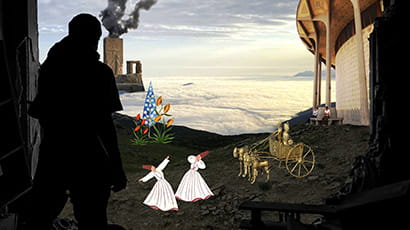
26 August 2025
UWE Bristol MA students present Showcase at Spike Island
Students from MA Fine Art, MA Graphic Arts, and MA Multi-Disciplinary Printmaking will exhibit their work at the Showcase MA Degree Show, from 4 September.
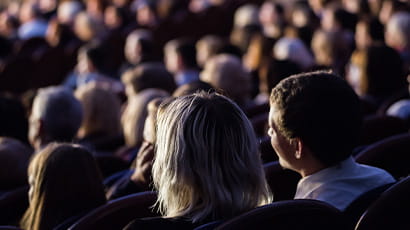
23 May 2025
Academics feature in documentary exploring the rebirth of Bristol's iconic Megascreen
Professor Mark Bould and Professor Charlotte Crofts are featured in a new documentary about the fascinating journey of the former Bristol IMAX cinema.
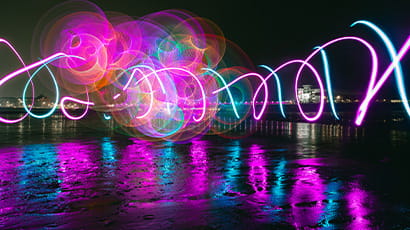
21 May 2025
Students reveal creative responses to real-world experiences at UWE Bristol Showcase
UWE Bristol’s Showcase, celebrating student creativity and innovation across the College of Arts, Technology and Environment, returns this June.
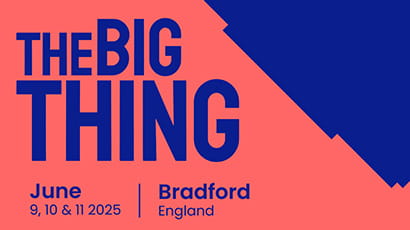
19 May 2025
The Big Thing, a landmark event for immersive artists in the UK, comes to Bradford
Immersive Arts will launch its first major event this June in Bradford, the UK’s City of Culture, to bring together the country’s immersive arts community.
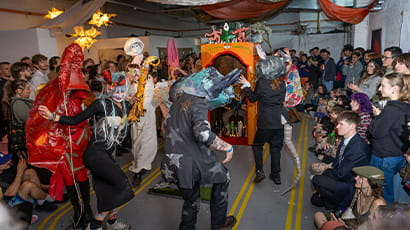
17 April 2025
UWE Bristol art students showcase work at Spike Island Open Studios
Spike Island – the home to UWE Bristol’s BA and MA Fine Art courses - opens its doors for the annual Open Studios on 2 May.
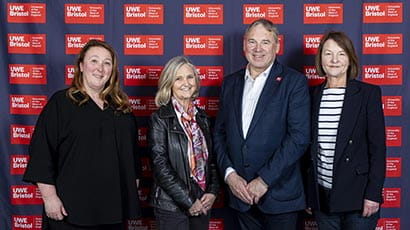
04 April 2025
New partnership between UWE Bristol and Bristol Creative Industries will develop student talent network
UWE Bristol and Bristol Creative Industries (BCI) have formed a new partnership to support Bristol’s thriving creative businesses and provide enhanced careers opportunities to students entering the industry.
You may also be interested in

Media enquiries
Enquiries related to news releases and press and contacts for the media team.
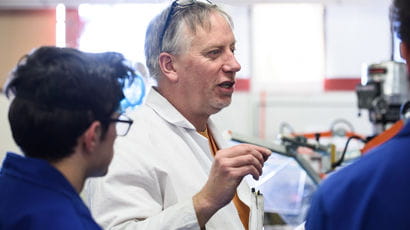
Find an expert
Media contacts are invited to check out the vast range of subjects where UWE Bristol can offer up expert commentary.






